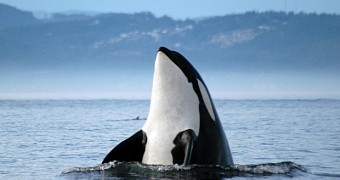Orcas look anything but menacing when swimming around in teeny tiny tanks at one wildlife park or another. Still, there is a reason these marine mammals also go by the name of killer whales.
Thus, marine biologists with the US National Oceanic and Atmospheric Administration say that, not long ago, they chanced to witness a group or orcas hunting and killing a defenseless pygmy sperm whale.
The incident occurred in the waters off the coast of California, at a distance of about 200 miles (322 kilometers) from the shoreline. When biologists finally reached the scene of the crime, all that was left was the pygmy whale's heart and lungs.
At first, it wasn't even clear what the orcas had eaten
Research biologist Britanny Hancock-Hanser and colleagues explain that, because the killer whales left behind nothing but their victim's lungs and heart, they had some trouble figuring out what exactly the orcas had feasted on.
To solve this riddle, the wildlife researchers collected DNA samples from the recovered organs and then compared them to the Southwest Fisheries Science Center database, which holds about 60,000 samples of DNA belonging to marine mammals and sea turtles.
Based on the DNA samples obtained from the lungs of the creature killed and eaten by the orcas, Britanny Hancock-Hanser and colleagues managed to identify the victim as being a rare pygmy sperm whale.
“We didn't know what that animal was. But given the capacity of our lab and how much work we've done on cetaceans, we knew we had a pretty good chance of figuring that out,” the researcher said in a statement, as cited by Science Daily.
This incident just goes to show killer whales are top predators
Researchers say that, like plenty of other species, pygmy sperm whales don't really enjoy being the center of attention. They spend their most of their life out in the open ocean and are very rarely seen. In fact, the species is chiefly studied by performing necropsies on the creatures that wash ashore.
Despite being elusive creatures, it appears that not even pygmy sperm whales can escape orcas. In fact, Britanny Hancock-Hanser and colleagues say that the hunt that played out in the waters off the coast of California just goes to show that orcas are such good predators that they can turn any marine mammal into their next meal.

 14 DAY TRIAL //
14 DAY TRIAL //